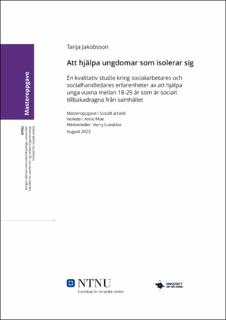Att hjälpa ungdomar som isolerar sig: En kvalitativ studie kring socialarbetares och socialhandledares erfarenheter av att hjälpa unga vuxna mellan 18–29 år som är socialt tillbakadragna från samhället
Master thesis
Permanent lenke
https://hdl.handle.net/11250/3107437Utgivelsesdato
2023Metadata
Vis full innførselSamlinger
- Institutt for sosialt arbeid [1367]
Sammendrag
Syftet med denna magisteravhandling är att undersöka vilka erfarenheter socialarbetare och socialhandledare inom vuxet socialt arbete har av att arbeta med unga vuxna som är socialt tillbakadragna. Fokus sätts på de utmaningar som de professionella kan möta på i arbetet med målgruppen och relateras till det handlingsrum som de professionella arbetar inom. Avhandlingen strävar även till att belysa de arbetssätt som har visat sig vara positiva för att hjälpa målgruppen och framför faktorer som kunde hjälpa och stärka de professionella i deras arbete med målgruppen. Avhandlingen fördjupar sig i problematiken kring ungdomar som är socialt tillbakadragna genom att undersöka de professionellas förståelse av fenomenet och belysa de bakomliggande faktorerna som ofta kan ligga som grund för social tillbakadragning.
Denna magisteravhandling grundar sig på en kvalitativ studie med fem semistrukturerade intervjuer. Alla informanter hade erfarenhet av att arbeta med unga vuxna mellan 18–29 år som är socialt tillbakadragna och arbetade inom vuxet socialt arbete inom Österbottens välfärdsområde i Finland. Av de fem informanterna som intervjuades så jobbade tre som socialhandelare och två som socialarbetare inom vuxet socialt arbete. Intervjuerna spelades in med diktafon och transkriberades noggrant efteråt. För att trygga ett starkt induktivt (empiriskt drivet) tillvägagångssätt och ge struktur till arbetsprocessen så grundar sig analysen i studien på stegvis deduktiv-induktiv metod (SDI-metod) (Tjora, 2021, s. 252). Genom att basera forskningen på empiri så blev forskningen mera levande och det var informanternas svar som styrde vad som var intressanta teman och fenomen inom forskningen.
Resultatet av studien påvisar att de professionella innefattar en medicinsk/diagnostisk förståelse av fenomenet, en kontextuell förståelse av fenomenet och en samhällsmässig förståelse av fenomenet, som tillsammans bildar deras övergripande förståelse av social tillbakadragning. Även om informanterna förstår att social tillbakadragning uppstår på grund av individuella, kontextuella och samhällsmässiga faktorer så finns det ändå en brist på- och begränsade möjligheter till att arbeta med arbetsmetoder som angriper problematiken på en kontextuell- och samhällsmässig nivå. I tillägg till detta så leder tidsbrist och krav på effektivitet till att informanterna upplever att de inte kan arbeta med målgruppen enligt de värderingar som de anser att tillhör socialt arbete. Att ständigt stå i kläm mellan samhällets och administrationens krav på effektivitet och en egen önskan om att få bemöta- och arbeta med klienten enligt klientens egen takt och behov, gör att professionella befinner sig i en väldigt krävande situation som skapar en osäkerhet kring arbetet med målgruppen och leder till stress. The aim for this master thesis is to examine social workers and social advisor’s experiences of working with socially withdrawn youth within adult social work. The challenges that the professionals may face are related to the organizational framework surrounding them to further investigate the professional’s possibilities to help socially withdrawn youth. The thesis presents working methods that have been proven helpful for socially withdrawn youth and investigates if there is something that could aid and support the professionals in their work with the target group. In addition to this the phenomenon of social withdrawal and the underlaying causes are investigated and presented.
In this thesis, qualitative data was collected with five semi structured interviews. All the informants had experience of working with socially withdrawn youth in the age of 18-29, within adult social work in the Wellbeing services county of Ostrobothnia in Finland. Out of the five interviews, two of the informants were social workers and three were social advisors within adult social work. The semi structured interviews were recorded with a dictation machine and carefully transcribed afterwards. An inductive research process was used to make sure that the themes and phenomenon discussed were relevant and important for the informants, thus ensuring that the thesis can be useful for the practical work. To support and give structure to the qualitative research process, the stepwise-deductive inductive (SDI) approach was used (Tjora, 2021, s. 252).
The empirical evidence shows that the professionals have a medical/diagnostic understanding of social withdrawal, a contextual understanding of social withdrawal and a societal understanding of social withdrawal, which in combination reflects their overall understanding of the phenomena. Even though the professionals understand that social withdrawal occurs because of individual, contextual, and societal factors, there is a lack of working methods that would address the issue on a contextual and societal level. There is also limited possibilities to work with those methods that have been proven to be helpful for socially withdrawn youth. Lack of time and requirements for efficiency lead to a feeling of not being able to work with the youth according to the values that the professionals relate to social work. It is very stressful and emotionally difficult to be in a position where the society and administration requires efficiency, while the professionals would like to work with the clients at the client’s own pace and meet the client’s needs.
